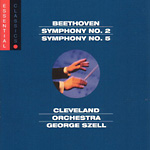George Szell leads taut, energetic, and texturally detailed performances of both symphonies–no surprise to anyone familiar with the other discs in this series. Szell’s briskly paced Symphony No. 2 sits comfortably in the classical tradition from which it sprang, in contrast to Bernstein’s expansive and romantic-style rendition with the Vienna Philharmonic. Once again comparison with period performance versions reveals Szell’s ability to maintain clear textures without the need to resort to period instruments.
In the Fifth Symphony Szell doesn’t go hell-for-leather in the first movement but nonetheless offers a gripping account that sets the stage for his superbly argued finale. With brilliantly judged tempos and stunning orchestral playing, Szell makes the finale the great summation it is often claimed to be. Every event follows with a satisfying sense of inevitability–just listen to how Szell heightens the drama by slowing the tempo for the development’s great climax, just before the reprise of the scherzo’s theme. Oh yeah, this is one of the great Fifths! Sony’s remastering reveals a noticeable amount of tape hiss but not enough to deter your enjoyment of these well-engineered and naturally balanced 1964 recordings.
































